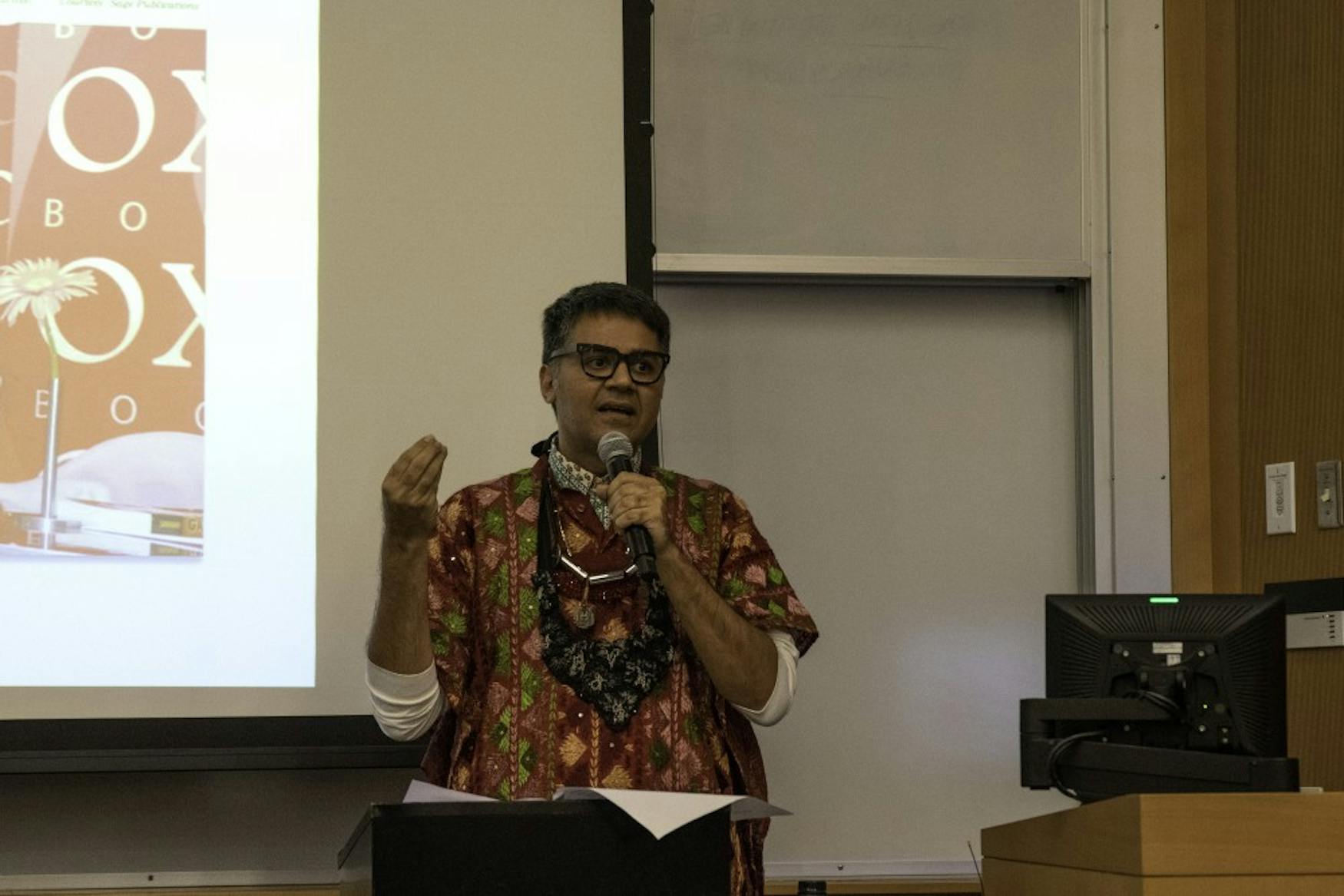Speaker examines LGBT themes in Indian culture
Parmesh Shahani talked about the Godrej India Culture Lab, which aims to foster diverse thinking.
Parmesh Shahani spoke about his work as founder and head of the award-winning Godrej India Culture Lab on April 11 in the Mandel Atrium. As the lab’s home page explains, it was established in 2011 “as a space for cross-pollination of ideas” to “challenge existing notions of culture and encourage dialogue and experimentation through innovative programming.”
Brandeis has connections with the lab — Assistant Prof. Brian Horton (ANTH) is a fellow there. Shahani invited Horton to speak later in the talk, along with DJ Rekha, who had given a talk in the culture lab in March 2014 about hip-hop appropriation in Bollywood.
Although born in India, Shahani has connections with the Massachusetts area. He graduated from the Massachusetts Institute of Technology in 2006 with a master’s degree in comparative media.
Shahani said that he first came out as gay to close friends and family, but in MIT he “came out [as gay] very publicly” when the BBC decided to feature him in a 2004 article titled “South Asian gays find US voice.” This was due to his work on raising LGBT awareness at MIT, organizing events such as a South Asian LGBT film festival. At the time of the article’s publication, Shahani said, he had many friends –– both those who already knew and those who had been unaware –– tell him that the “BBC says that you’re gay.” He said that since the article was before the era of fake news, he would respond with, “The BBC says that I’m gay … must be true.”
Shahani began talking about the Culture Lab by showing a few Bollywood clips from the 2008 movie “Dostana.” In the movie, two men, Sameer Kapoor and Kunal Chopra, pretend to be gay to rent an apartment, but they fall in love with the same woman. Shahani admitted that ”it’s super problematic at the text level because it’s actually not an LGBT-friendly film in a large sense.” However, he “was more interested in the subtext of acceptance.” When Kapoor’s conservative mother finds out that her son is “gay,” she is shocked, but she accepts the relationship by “repurposing tradition,” using the same traditions to welcome Chauhan into the family as she would a daughter-in-law. “Dostana” may have distorted LGBT representation, Shahani said, but it was one of the first Bollywood films to have any LGBT themes.
“With ‘Dostana,’” Shahani remarked, “for the first time you had this … product that you could then use to have cultural discussions.” He explained that he had a similar goal in mind when creating the Culture Lab: he would host events that would serve as a reference point for difficult discussions. Shahani gave an overview of the topics the Culture Lab has addressed, including marginality, identity politics, urban and rural narratives and the future of the environment.
Shahani also provided examples of various events that the Culture Lab has organized, including “Queeristan: Caste and Queerness,” which was held in January. He showed a video from the event of poet and activist Dhiren Borisa talking about what it means to be both queer and Dalit, which is also known as “the untouchables.” Dalits are not even part of the caste system; they are said to be born below it. In the video, Borisa said that being Dalit and being queer are not two separate identities. Instead, “Dalit queerness is this threshold which is always slippery, always messy. Therefore [he] can’t give you a neat definition [of what it means to be Dalit queer] because there’s no neat definition.”
The Culture Lab holds many other types of events beyond simply inviting guest speakers. They set up a pop-up museum about the bloody India-Pakistan partition, in honor of the 70th anniversary of Indian independence. They also screened a documentary about six public health activists to generate a discussion on public health that would coincide with the beginning of the 2019 Indian election cycle.
Shahani spoke about why Culture Lab has been so successful. The lab receives funding from the Godrej Group, a massive Indian conglomerate making “everything from soaps to spaceship component[s],” Shahani said. He explained that despite being a very large, diversified company, it is firmly rooted in an idea of “Indianness.” If the culture lab was based in “Google or … another sexy cool international company, the [results] would be very different.” However, Shahani explained that despite Godrej funding, “[the company] is completely arm’s length away,” letting the lab pursue its own course, in part because the culture lab deals with issues that Godrej might find uncomfortable.
Another reason for the lab’s success, according to Shahani, is its constant evolution. He explained that the lab started as an “event space,” but now it is also used as a “catalyst.” The culture lab can use its influence to “empower other event spaces.”
Shahani said that the culture lab has made a particular effort to focus on LGBT inclusion, partly due to the uncertain attitude of the Indian government towards LGBT rights. He explained that the Indian High Court, the supreme court of India, overturned section 377, a law banning homosexuality, in 2009. It reversed this decision in 2013, and in 2018 the High Court reversed its decision once more, taking away section 377 once more.
The lab advocates for LGBT inclusion by using hard statistics and appealing to financial interest, Shahani explained, saying that “people understand the language of money more than they understand the language of human rights.” He said that 92 percent of transgender people who are able and willing to work cannot find jobs, and that this market is worth $200 million. “No one changes because you want them to change,” Shahani said. “[They] must recognize that change is good for them.” He remarked that the lab’s position within the Godrej group is very important for instigating change because “corporations have more and more influence. So to be located within the corporation, to push [it] to act as an agent for good in whichever way you can [and] to use that to put pressure on other parts of society is a useful thing to do.”
Shahani closed his lecture by imparting some last thoughts about how fundamental realities of society are changing. “The age of either/or binary thinking is over … more and more, where you are located matters less than what you do with that location ... it is important to recognize all the privileges you have,” he said.
Shahani ended with a short film which showed an orphaned child talking about how she was taken in by a transgender woman. “My civics lesson says everyone is guaranteed basic rights. Then why is my mom denied them?” the child said in the documentary. Shahani explained that he showed this video to bookend the “Dostana” clips. In the beginning of the lecture, the audience saw a mother changing her perspective on the potential relationships her son might have, and in the end the audience was asked to change their own perspective on what they may view as unconventional motherhood.
The lecture ended with a Q&A; Shahani gave out books to people who asked questions. One question was about the lab’s ability to form an alliance with corporate members, not necessarily the most naturally accepting members of society. Shahani responded that it “comes down to us being super transparent … telling [everyone] the same story.” He continued, “My commitment is to the issue.”




Please note All comments are eligible for publication in The Justice.